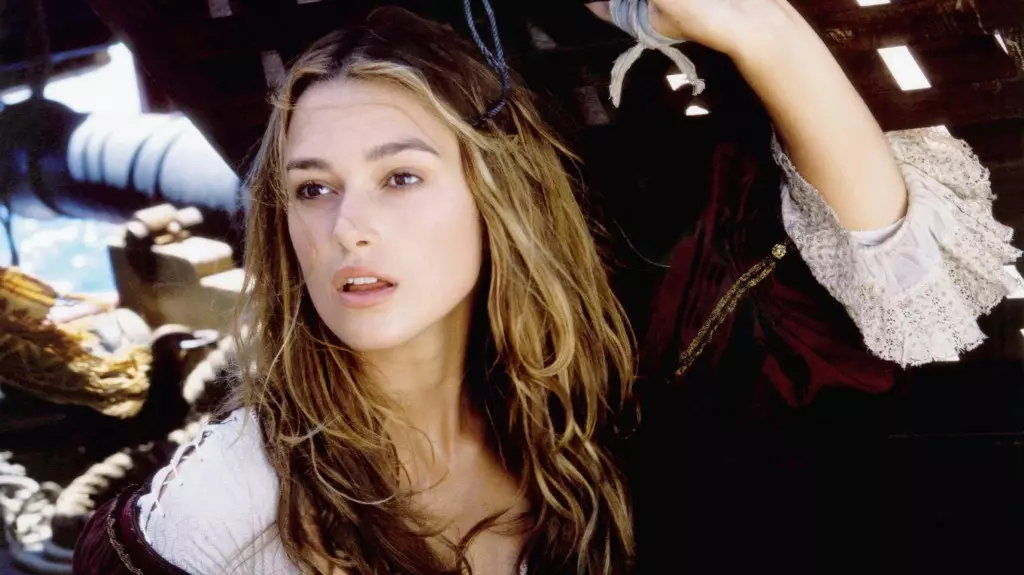Since she first graced the screen at the tender age of 17, Keira Knightley has become one of the most recognizable names in Hollywood, particularly due to her role in the iconic *Pirates of the Caribbean* series. However, in a recent interview with The Times of London, Knightley expressed a firm decision to step away from the franchise format, illustrating the complex relationship she has had with her fame and Hollywood’s expectations. Knightley’s experiences serve as an essential reflection on the nuances of celebrity culture, particularly for women who navigate the pressures of public scrutiny amidst their careers.
In her portrayal of Elizabeth Swann across the trilogy, which began with *Curse of the Black Pearl* in 2003 and continued through *Dead Man’s Chest* and *At World’s End*, Knightley found herself simultaneously elevated and scrutinized. In her words, “I was seen as sh*t because of them,” speaking of the mixed blessings that come with participating in blockbuster franchises. This irony—where the very success of a project can also lead to personal struggles—outlines a reality often overlooked in discussions about fame.
Knightley’s reflections point toward a broader issue within the film industry—one marked by unrealistic expectations and the demanding nature of major film productions. Her recollection of the grueling hours and lack of creative control in these projects raises critical questions about the sacrifices actors make for commercial cinema. “The hours are insane,” she stated, reflecting on the exhausting schedule that accompanies franchise filmmaking. These commitments can lead to creative burnout and a loss of agency, spotlighting a systemic issue in Hollywood that pushes artists toward roles that may not resonate with their personal narratives or artistic ambitions.
Moreover, her candidness about her struggles with public perception demonstrates the harsh reality of being thrust into the limelight at such a young age. The scrutiny she faced concerning her body image, particularly in an era when mental health issues were largely stigmatized, reveals the damaging social and media narratives that can accompany fame. “I knew I wasn’t,” she recounted, juxtaposing her true self with the misconceptions propagated by tabloids. This experience raises significant discourse on the responsibility of the media when covering celebrities, emphasizing the need for a more empathetic approach to individuals who are frequently subjected to invasive public analysis.
In recent years, Knightley has taken steps to recalibrate her relationship with her career, particularly after becoming a mother. The choice to step back from acting while raising her two daughters with musician James Righton underscores her prioritization of family and personal well-being over the relentless pursuit of success in Hollywood. This choice not only highlights her commitment to motherhood but also reflects a growing trend among actresses who seek to redefine their careers on their terms.
Despite her reservations about returning to franchises, Knightley is set to make a comeback in Netflix’s six-part series *Black Doves,* collaborating with actor Ben Whishaw. This move indicates that while she may distance herself from high-pressure tentpole productions, her passion for the craft remains intact. The choice to engage with a more concise and potentially less demanding project could signify a thoughtful approach to her career, one that values substance over sheer scale.
Keira Knightley’s career trajectory underscores the complexities of fame—an intricate tapestry woven with threads of success, trauma, identity, and resilience. While her time in the *Pirates of the Caribbean* saga bestowed her with unprecedented fame, it also brought forth challenges that continue to inform her creative decisions. As she continues to navigate the landscape of Hollywood with a more discerning perspective, Knightley’s story serves as a vital reminder of the importance of mental health and personal agency amidst the challenges of stardom.
In a world where the glitz and glamour often overshadow the real struggles behind the scenes, Knightley’s narrative invites an essential dialogue about the true cost of fame and the need for transformation within the industry itself. Her intentional choices reflect not just her growth as an artist but also her commitment to embracing authenticity in a world that often favors the superficial. Through her journey, she continues to inspire a generation of actors to advocate for their mental health, artistic freedom, and personal narratives.

